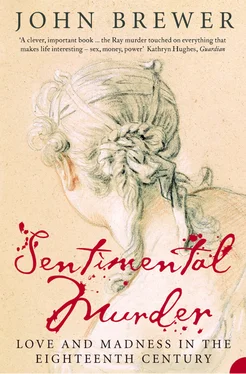The trial opened with the prosecution, which called witnesses to prove the facts of the case. Macnamara’s was the chief testimony. He was followed by ‘Mary Anderson, a fruit girl’ who had also seen the killing, and by an apothecary, Mr Mahon, who had seized one of the pistols from Hackman and helped the constable Blandy make his arrest. The final witness was Mr O’Brien, one of the surgeons who had given evidence at Ray’s inquest. None of the facts were contested by the defence. Sir William Blackstone, who chaired the bench, invited Hackman to offer anything material in his defence. Reading from a prepared statement, the young man admitted the crime, professed himself ready to die, but explained his act as a brief moment of madness: ‘I protest, with that regard for truth which becomes my situation, that the will to destroy her who was ever dearer to me than life, was never mine, until a momentary phrenzy overcame me, and induced me to commit the deed I deplore.’ Hackman’s counsel, Davenport, one of the most famous lawyers of the day, argued the case for insanity, maintaining that Hackman’s suicide note, in which he had asked Booth to take care of Ray after his death, showed that he had not originally intended to kill her.
But the court was not persuaded of the defendant’s case. Blackstone argued that the presence of two pistols showed felonious intent. He added that ‘the prisoner has rested his defense upon a sudden phrenzy of mind; but the judge said, that it was not every fit, or start of tumultuous passion, that would justify the killing of another; but it must be the total loss of reason in every part of life’. The jury was instructed to convict the accused, and Hackman was condemned to death. Boswell hurried from the courtroom to tell Booth, who received the news with ‘ mains serrees ’ 42 (clenched fists).
Eighteenth-century justice was swift. Three days later Hackman woke a little after five in the morning, and spent two hours in private prayer, before taking communion in the chapel in Newgate prison. At nine ‘he came into the press-yard, where a great croud of persons assembled to satisfy their curiosity, at the expense of one shilling each. That all might have an equal share of the sight, a lane was formed by the multitude on each side, through which Mr Hackman passed, dressed in black, leaning on the arm of his friend the Rev. Mr Porter, whose hand he squeezed as he muttered the solemn invocation to Heaven, not to forsake a sinner of so enormous a degree, in the trying hour of death 43 .’ Haltered with the rope with which he would be hanged, Hackman was reported as exclaiming, ‘Oh! the sight of this shocks me more than the thought of its intended operation.’ Driven in his mourning coach to Tyburn, jeered and cheered by a group of building workers in Holborn, he spent his final minutes praying for Martha Ray, the Earl of Sandwich and their children, before being ‘launched into Eternity’ at about ten minutes past eleven. James Boswell, who witnessed the hanging, and asked the executioner if he had heard Hackman’s last words (‘No. I thought it a point of ill manners to listen on such occasions’), ended the day drunk: ‘Claret h. Very ill 44 .’
Hackman’s body, like that of all murderers, was then sent to Surgeon’s Hall for dissection. On the day after the execution the nineteen-year-old fencing master Henry Angelo went with a friend to Surgeon’s Hall to view the corpse. ‘Having been placed on a large table, an incision had been made on his stomach, and the flesh was spread over on each side 45 .’ Angelo’s next stop was Dolly’s Chop House, but the memory of Hackman’s flesh was too much. He was unable to eat his pork chops and never touched the dish again.
The press reckoned that Hackman’s execution attracted the largest crowd since the hanging of another clergyman, William Dodd, for forgery three years earlier. (Such was the press that two members of the crowd died, trampled after they fell.) But Dodd had been a public figure: the chaplain of the Magdalen Hospital for penitent prostitutes, author of a successful Shakespeare anthology, the friend of literati like Dr Johnson, and the client of a number of prominent aristocrats. Hackman was a nobody before he murdered Ray. Now he was an object of public fascination. When he had dropped his handkerchief to signal he was ready to die, the hangman got down from the cart and pocketed it; the souvenir was very valuable. On the day after his execution, a crowd pressed into the Surgeon’s Hall to see the body: ‘Soon after the doors 46 were opened, so great a crowd was assembled that no genteel person attempted to gain admittance, as it was observed that caps, cardinals, gowns, wigs and hats, &c. were destroyed, without regard to age, sex or distinction.’ In death, as in life, Hackman was able to cause mayhem.
After the first few days of frenzied activity that followed the murder, Sandwich left the Admiralty office and retreated to a friend’s house in Richmond. From there he wrote an importunate note to Lord Bristol, asking him to postpone the opposition’s motion in the House of Lords for his removal as First Lord of the Admiralty:
It is understood 47 that navy matters are to be discussed in the House of Lords on Thursday or Friday next. I am at present totally unfit for business of any kind and unable to collect any materials to support the side of the question that I must espouse. I perceive impropriety in putting off the business by a motion from anyone with whom I am politically connected; I have therefore recourse to your humanity, to request that you would contrive that this point is not brought on till after this day sevennight, by which time I hope to be fit for public business as I ever shall be.
Bristol promised to ask for a postponement, using the excuse that he was suffering from gout, and he ended his reply, ‘No-one can be more concerned than I am for any interruption to your domestic felicity 48 .’
Sandwich received many letters of advice and condolence. Aristocratic friends like Lord Hardwicke praised Martha Ray and reassured the Earl of their faith in her virtue: ‘From what I have heard 49 of her Conduct I never doubted but it had been entirely irreproachable.’ Even the prudish George III, who had once argued that Sandwich should not hold political office because of his notorious private life, offered the Earl his sympathy, using a stilted formula that ensured that he did not have to mention Ray’s name: ‘I am sorry 50 Lord Sandwich has met with any severe blow of a private nature. I flatter myself this world scarcely contains a man so void of feeling as not to compassionate your situation.’ One of his colleagues urged on Sandwich the stoicism he had shown in political adversity: ‘You have suffered much and the utmost exertion of your fortitude is now required. Show yourself in this my Lord, as you have done in most other things equal if not superior to the rest of mankind 51 .’ Others took a less sympathetic view. As George Duke Taylor remarked, ‘Enemies more inveterate than the rest make no scruple to affirm that they look upon these things are come down upon you as judgments, for your private and public conduct during these ten or twelve years past, which in their language have been both wicked and arbitrary.’ Over the next few years Sandwich’s opponents would occasionally refer to Martha Ray’s murder, but on the whole they respected his privacy.
It did not take long for Sandwich’s life to return to its old routines. He was back in the Admiralty office in the week after Hackman’s execution. He managed to survive the attempt to remove him from office, and was soon deeply involved in plans to thwart the French invasion and keep the government in power. He remained a key political figure until the British surrender at Yorktown effectively ended the American war and brought down Lord North’s government; even after he left the Admiralty, he had a small group of followers in the House of Commons and took an active interest in politics.
Читать дальше












